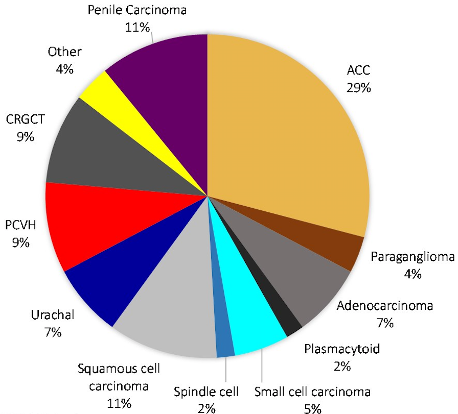(UroToday.com) Patients with rare genitourinary malignancies or histologic variants are excluded from many clinical trials. These include patients with bladder cancer of variant histologies, adrenal tumors, chemotherapy-refractory germ cell tumors, penile carcinoma and prostate cancer of variant histology, all of which are associated with poor outcomes. Treatment of these malignancies is currently an unmet need. Nivolumab and ipilimumab have demonstrated safety and efficacy in genitourinary malignancies, thus this combination may be a reasonable treatment regimen for these patients with few treatment options. At the virtual ASCO 2020 annual meeting, Bradley McGregor, MD, and colleagues presented results of their multicenter, single-arm, multi-cohort phase II trial evaluating the efficacy of nivolumab and ipilimumab in patients with advanced rare genitourinary cancers.
For this trial, eligible patients had a metastatic rare genitourinary malignancy, ECOG performance status of 0-2, and no prior immune checkpoint inhibitor exposure. Other than patients with chemotherapy-refractory germ cell tumors, patients could be treatment naïve. Eligible patients received nivolumab 3 mg/kg and ipilimumab 1 mg/kg intravenously every 3 weeks for 4 doses with continued nivolumab 480 mg IV every 4 weeks. The primary endpoint was overall response rate (ORR) by RECIST 1.1.
There were 57 patients enrolled at six institutions between April 2018 and July 2019 in 3 cohorts: bladder cancer of variant histologies (n = 19), adrenal cortical carcinoma (n = 19), and other tumors (n = 19). The types of histologies are as follows:
Median follow-up was 9.9 (range < 1-21) months. There were 28 patients (51%) that received all for doses of nivolumab and ipilimumab, and 25 patients (45%) received nivolumab maintenance at a median of 4 (range 1-18) cycles. The ORR for the entire cohort was 16% (80% CI 10-25%), including 37% (80% CI 22-54%) for patients with bladder cancer of variant histologies, and 6% (80% CI 1-20%) for both adrenal cortical carcinoma and other malignancies. The overall 12-month OS rate was 56% (95% CI 38-70%). For patients with bladder cancer of variant histologies (which had the best ORR), the response by histology is as follows:
There were 22 patients (39%) that developed treatment-related ≥ grade 3 toxicity, of which 24% required high dose steroids (≥40 mg prednisone or equivalent) and 15 (27%) patients discontinued treatment due to an adverse event. Grade 5 toxicity occurred in three patients, of which one death was treatment-related.
Dr. McGregor concluded his presentation of this phase 2 study of nivolumab + ipilimumab for rare genitourinary tumors and histologies with the following conclusions:
- Nivolumab and ipilimumab resulted in objective responses in a subset of patients with rare genitourinary malignancies, especially in patients with bladder cancer of variant histologies
- Biomarkers are being evaluated and an additional cohort exploring the activity in genitourinary tumors with neuroendocrine differentiation is ongoing
- This combination warrants further investigation in these patients with substantial unmet needs
Presented by: Bradley McGregor, MD, Clinical Director, Senior Physician, Instructor in Medicine, Lank Center for Genitourinary Oncology, Harvard Medical School, Dana-Farber Cancer Institute
Co-Authors: Matthew T Campbell, Wanling Xie, Subrina Farah, Mehmet Asim Bilen, Guru Sonpavde, Kerry L. Kilbridge, Atish Dipankar Choudhury, Amir Mortazavi, Amishi Yogesh Shah, Aradhana M. Venkatesan, Glenn Bubley, Arlene O. Siefker-Radtke, Rana R. McKay, Toni K. Choueiri; The University of Texas MD Anderson Cancer Center, Houston, TX; Dana Farber Cancer Institute/Harvard, Boston, MA; Department of Hematology and Medical Oncology, Emory University School of Medicine, Atlanta, GA; Department of Genitourinary Oncology, Dana Farber Cancer Institute, Boston, MA; Lank Center for Genitourinary Malignancy, Dana-Farber Cancer Institute, Boston, MA; Arthur G. James Cancer Hospital, Ohio State University Wexner Medical Center, Columbus, OH; Beth Israel Deaconess Medical Center, Boston, MA; Dana-Farber Cancer Institute and Harvard Medical School, Boston, MA
Written by: Zachary Klaassen, MD, MSc – Assistant Professor of Urology, Georgia Cancer Center, Augusta University/Medical College of Georgia, Twitter: @zklaassen_md at the 2020 American Society of Clinical Oncology Virtual Annual Meeting (#ASCO20), May 29th-May 31st, 2020
Related Content:
Clinical Trial Information: NCT03333616 — A Phase II Study of Nivolumab Combined With Ipilimumab for Patients With Advanced Rare Genitourinary Tumors
Watch: Clinical Trial Treatment Options for Rare GU Malignancies - Bradley McGregor


